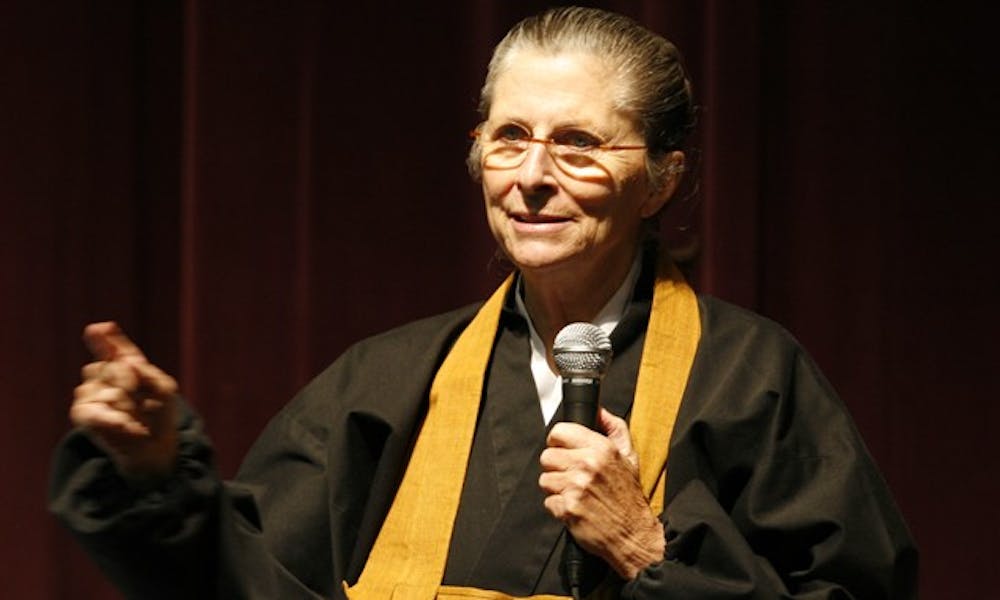Many tragic events are impossible to predict. But as a practicing Buddhist, Joan Halifax says it is best not to even try.
Halifax, a Buddhist teacher, anthropologist and author, recalled how when she was in her 20’s during the 1960s, she could have not anticipated the fall of the Berlin Wall or the election of President Barack Obama. She embraces the uncertainty.
“In Buddhism, we are taught to be the truth we don’t know,” Halifax said. “Theoretical uncertainty is a really important theme today.”
Duke Chapel’s Faith Council and the Buddhist community at Duke hosted Halifax Tuesday night at Griffith Theater for a talk titled “Living in a World of Radical Uncertainty.”
Throughout her speech, Halifax alluded to her Buddhist principles. Halifax’s third Zen teacher taught her the three tenants of the Zen Peacemaker Order: not knowing, bearing witness and compassionate action.
Over the course of her career, Halifax has counseled both death row inmates and terminally ill patients about the uncertainty of death and how to cope with it.
“I have no advice to give them,” she said, explaining how she responds when patients ask her about the afterlife. “But I am very supportive of what people’s intuition tells them.”
Halifax’s counseling is partly inspired by her visits to the sites of several historic tragedies. She has visited the Auschwitz concentration camp twice, and said both trips had a profound effect on her. During her first visit, she attended an interfaith conference where discussions among participants revealed how difficult it is to process a tragedy of that scope. Later, a friend told her they needed to visit Nanjing, China, the site of a 1937 massacre at the hands of the Japanese.
“No one could put their arms around the magnitude of the atrocity that happened,” she said.
Halifax said the lessons she has learned from past tragedies are very applicable today.
“We’re in a time where the sense of catastrophe is very present,” she said.
To illustrate the interfaith response to catastrophe, Halifax’s talk was followed by a discussion panel with Rabbi for Jewish Life Michael Goldman and Paul Griffiths, Warren Professor of Catholic Theology at the Divinity School. Goldman emphasized the importance of ethics over epistemology.
“We shouldn’t worry about natural disasters, which we can’t control, but rather our actions, which we can,” he said.
Griffiths said suffering is essential to Christianity, noting that two-thirds of the Psalms are laments.
“I think it’s central to a Christian response to begin with lament and end with lament,” he said.
All religious leaders present—representing Buddhism, Catholicism and Judaism—stressed the importance of love to their faiths, especially as a means of coping with adversity.
“Get rid of greed, hatred and delusion and you end up with love,” Griffiths said. “The gift of love, in order to be a gift, has to come from some place other than me.”
Senior Priyanka Sista said she enjoyed the event’s interfaith balance.
“I know very little of other faiths,” she said. “It’s nice to hear about other perspectives.”
Durham resident Andy Stewart said he was grateful to attend the speech.
“It was absolutely remarkable,” he said. “If we didn’t live in Durham, we wouldn’t have the opportunity to be stretched like the three there stretched us.”
Get The Chronicle straight to your inbox
Signup for our weekly newsletter. Cancel at any time.

